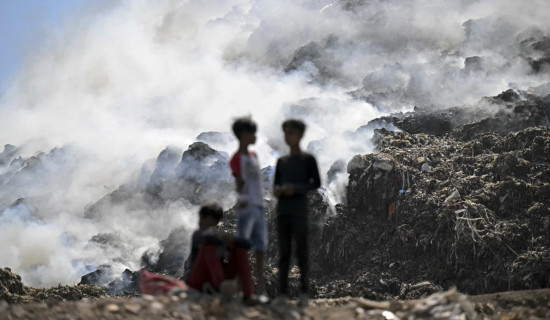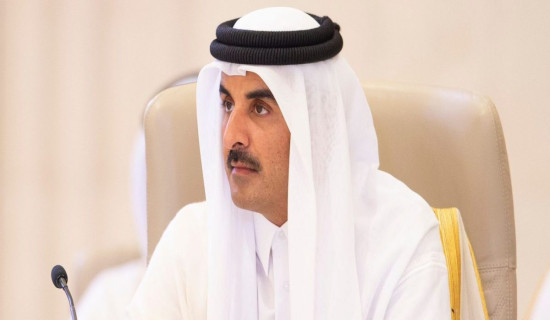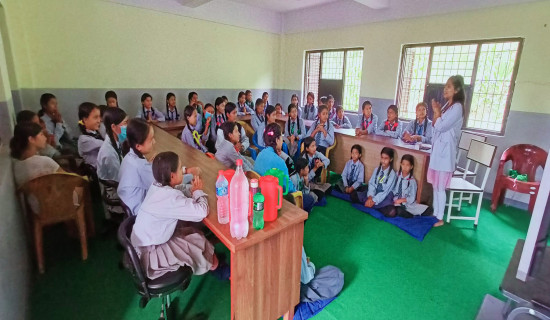- Tuesday, 23 April 2024
Expectations From PM’s India Visit
Prime Minister Pushpa Kamal Dahal Prachanda's official visit to India, scheduled to begin tomorrow (May 31 to June 3 ) at the invitation of his Indian counterpart Narendra Modi, is expected to shine a new light on Nepal-India relations, as it aims to strengthen the unbreakable and unique bond, rooted in their history, culture, tradition, and religious similarities.
Nepali Prime Ministers' trips to India usually generate a slew of interest in Nepal, considering the country's heavy dependence on the southern neighbour in comparison to any other nation. The way in which India reciprocates such trips is extremely important in Nepal. Without a doubt, India casts a long shadow over Nepal, as indicated by the tradition as per which Nepali Prime Ministers begin their official overseas visits from India. Prime Minister Prachanda, on his first visit to India since taking office on December 25, has followed in the footsteps of his predecessors. In order to keep this practice going, he declined China's invitation to the annual Boao Forum gathering.
'Hot questions'
From Nepal’s perspectives, there are some 'hot questions' that Nepal needs answered during our PM’s visit. One major question is whether PM Prachanda would be able to effectively raise the issue of Kalapani-Lipulekh-Limpiyadhura with his Indian counterpart and persuade him to strike an arrangement for both sides’ advantage. The settlement of this highly testing matter will be awaited with bated breath by experts on Nepal-India relations as well as ordinary citizens, as it will illustrate how Nepal handles delicate issues without jeopardising the ties with India.
Another critical issue is whether our Prime Minister can persuade his Indian counterpart to accept the Eminent Persons' Group report, which calls for a review of the 1950 Peace and Friendship Treaty. Many Nepalis feel that the pact is flawed and should be revised. The tour will also assess if Nepal can obtain authorisation to sell its energy to Bangladesh via Indian territory, as well as whether the Indian side can offer direct entry routes for planes arriving at Bhairahawa and Pokhara's international airports.
These questions have unnerved many Nepalis, who are hoping that the official visit of the Nepali Prime Minister would dispel all lingering suspicions. It is critical that this visit serve as a watershed moment in reviving the connections that were at their worst during KP Sharma Oli's tenure. Following the border conflict sparked by India’s construction of a link road in the disputed Kalapani-Lipulekh territories, Oli's administration quickly produced a new map of Nepal that included this territory, igniting a cartographic conflict with its southern neighbour.
Our relationships with India have fluctuated throughout the last seven decades, experiencing both highs and lows. Despite these oscillations, the relationship has a brighter side that originates from the two closest neighbours' strong socio-cultural tie, which is the core of their friendship.
A variety of factors have distinguished the bilateral relationship, ranging from cultural exchanges and economic cooperation to occasional obstacles and diplomatic disputes. Millions of Nepalis and Indian nationals live and work in each other's countries, contributing to social cohesion and the economy of both countries. Furthermore, cultural links, pilgrimages, festivals, and shared heritage celebrations have increased understanding and fraternity between Nepalis and Indians.
Aside from being a significant donor nation, India is Nepal's major economic partner, with bilateral commerce continuously expanding. Cross-border infrastructure, energy cooperation, and trade facilitation have all played important roles in strengthening economic integration between the two countries. Through investments, grants, and capacity-building projects, India has played an important role in Nepal's development, notably in infrastructure, education, healthcare, agriculture, and technology.
However, the partnership has not been without its difficulties. Border conflicts have periodically affected bilateral relations, causing to diplomatic problems in the Kalapani-Lipulekh, Susta, and other territories. Both countries have participated in dialogues to resolve these challenges, but no long-term solution has yet been found.
Nepal has also had trade imbalances and non-tariff restrictions, which have hampered its economic progress. Concerns have been raised about Nepali products' limited market access and trade imbalances. Both nations must work together to reduce trade obstacles, promote fair trade practices, and explore new opportunities for economic engagement. As a rising economic power, India should be gracious in addressing Nepal's concerns about these challenges.
Nepal has voiced concerns over alleged Indian intervention in its domestic issues, straining the bilateral relationship. Both nations must try to create an environment of mutual respect and non-interference in each other's domestic affairs in order to build a healthy and balanced relationship. Nepal aims to establish its sovereignty and pursue a more balanced foreign policy, which India should recognise and respect.
Power trade
Foreign investment is critical to a country's development, and Nepal should actively encourage Indian businessmen to look for possibilities inside its boundaries. Prime Minister Prachanda should encourage Indian investors to invest in Nepal, particularly those interested in fully using Nepal's water resources, which can result in huge economic advantages. Furthermore, the long-delayed Pancheswor multifunctional project need quick agreement and significant efforts towards execution. Nepal's power trade and development deal with India has paved the path for power exports, opening up a large market for Nepali electricity exports. Nepal should also strive to gain from Prime Minister Modi's 'Neighbourhood First' policy.
Meanwhile, it is also equally important for Nepal to recognise India's security concerns. Several anti-Indian elements have infiltrated Nepal by taking advantage of the country's long open border with India. Our authorities should also respond to Indian parties' requests that various India-funded projects or firms operate successfully in Nepal.
To summarise, open communication, trust-building, and collaboration are critical to strengthen and reinvigorate the two nations' age-old relationships. During PM Prachanda's official visit to India, both countries should utilise the opportunity at hand, strengthening historical links and working towards a brighter future for their people.
(Upadhyay is a former Managing Editor of this daily)















